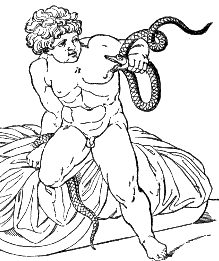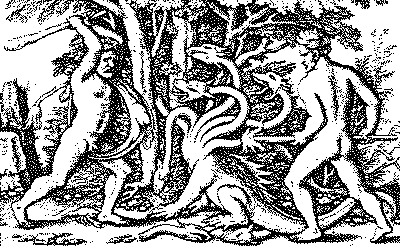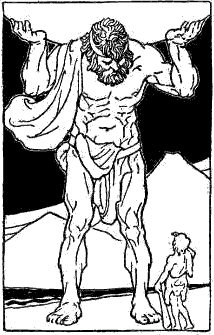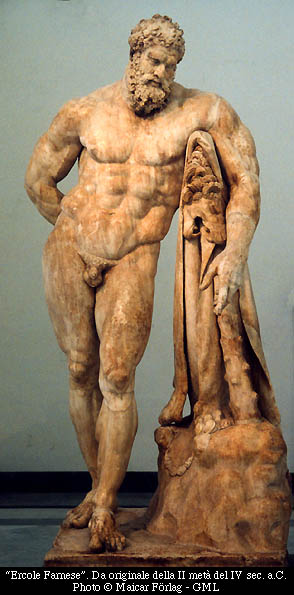{Prometheus and Man} {Pandora's Box} {Apple of Discord} {Achilles' Heel} {Trojan Horse}
{Echo} {Golden Touch} {Sisyphus's Stone} {Labors of Hercules} {Man Who Loves a Statue}
The Labors of Hercules
大力神的十二任務![]()
Hercules was the son of Zeus
and Alcmena. As Juno (Hera)
was always hostile to the offspring of her husband by mortal mothers, she
declared war against Hercules from his birth.  She sent two serpents to destroy him as he lay in his cradle, but the
precocious infant strangled them with his own hands. He was, however, by the
arts of Juno rendered subject to Eurystheus
and compelled to perform all his commands. Eurystheus enjoined upon him a
succession of desperate adventures, which are called the "Twelve Labors of Hercules." The first was the fight with the Nemean lion.
The valley of Nemea
was infested by a terrible lion. Eurystheus ordered Hercules to bring him the
skin of this monster. After using in vain his club and arrows against the
lion, Hercules strangled the animal with his hands. He returned carrying the
dead lion on his shoulders; but Eurystheus was so frightened at the sight of
it and at this proof of the prodigious strength of the hero, that he ordered
him to deliver the account of his exploits in future outside the town.
She sent two serpents to destroy him as he lay in his cradle, but the
precocious infant strangled them with his own hands. He was, however, by the
arts of Juno rendered subject to Eurystheus
and compelled to perform all his commands. Eurystheus enjoined upon him a
succession of desperate adventures, which are called the "Twelve Labors of Hercules." The first was the fight with the Nemean lion.
The valley of Nemea
was infested by a terrible lion. Eurystheus ordered Hercules to bring him the
skin of this monster. After using in vain his club and arrows against the
lion, Hercules strangled the animal with his hands. He returned carrying the
dead lion on his shoulders; but Eurystheus was so frightened at the sight of
it and at this proof of the prodigious strength of the hero, that he ordered
him to deliver the account of his exploits in future outside the town.
His next labor was the slaughter of the Hydra.
This monster ravaged the country of Argos,
and dwelt in a swamp near the well of Amymone. This well had been discovered by Amymone
when the country was suffering from drought, and the story was that Neptune (Poseidon),
who loved her, had permitted her to touch the rock with his trident, and a
spring of three outlets burst forth. Here the Hydra took up his position, and
Hercules was sent to destroy him. The Hydra had nine heads, of which the middle
one was immortal. Hercules struck off its heads with his club, but in the place
of the head knocked off, two new ones grew forth each time. At length with the
assistance of his faithful servant Iolaus,
he burned away the heads of the Hydra, and buried the ninth or immortal one
under a huge rock.
Another labour was the cleaning of the Augean stables. Augeas,
king of Elis,
had a herd of three thousand oxen, whose stalls had not been cleansed for
thirty years. Hercules brought the rivers Alpheus and Peneus through them, and
cleansed them thoroughly in one day.
His next labor was of a more delicate kind. Admeta, the daughter of
Eurystheus, longed to obtain the girdle of the queen of the Amazons,
and Eurystheus ordered Hercules to go and get it. The Amazons
were a nation of women. They were very warlike and held several

Another task enjoined him was to bring to Eurystheus the oxen of Geryon, a monster with three bodies, who dwelt in the island of Erytheia (the red), so called because it lay at the west, under the rays of the setting sun. This description is thought to apply to Spain, of which Geryon was king. After traversing various countries, Hercules reached at length the frontiers of Libya and Europe, where he raised the two mountains of Calpe and Abyla, as monuments of his progress, or, according to another account, rent one mountain into two and left half on each side, forming the straits of Gibraltar, the two mountains being called the Pillars of Hercules. The oxen were guarded by the giant Eurytion and his two-headed dog, but Hercules killed the giant and his dog and brought away the oxen in safety to Eurystheus.
 The most difficult labor of all was getting the golden apples of the Hesperides,
for Hercules did not know where to find them. These were the apples which Juno
had received at her wedding from the goddess of the Earth (Gaia),
and which she had intrusted to the keeping of the daughters
of Hesperus, assisted by a watchful dragon. After various adventures
Hercules arrived at Mount Atlas in Africa. Atlas
was one of the Titans
who had warred against the gods, and after they were subdued, Atlas was
condemned to bear on his shoulders the weight of the heavens. He was the
father of the Hesperides,
and Hercules thought might, if any one could, find the apples and bring them
to him. But how to send Atlas away from his post, or bear up the heavens while
he was gone? Hercules took the burden on his own shoulders, and sent Atlas to
seek the apples. He returned with them, and though somewhat reluctantly, took
his burden upon his shoulders again, and let Hercules return with the apples
to Eurystheus.
The poets, led by the analogy of the lovely appearance of the western sky at
sunset, viewed the west as a region of brightness and glory. Hence they placed
in it the Isles of the Blest, the ruddy Isle Erytheia, on which the bright
oxen of Geryon were pastured, and the Isle of the Hesperides. The apples are
supposed by some to be the oranges of Spain, of which the Greeks had heard
some obscure accounts.
The most difficult labor of all was getting the golden apples of the Hesperides,
for Hercules did not know where to find them. These were the apples which Juno
had received at her wedding from the goddess of the Earth (Gaia),
and which she had intrusted to the keeping of the daughters
of Hesperus, assisted by a watchful dragon. After various adventures
Hercules arrived at Mount Atlas in Africa. Atlas
was one of the Titans
who had warred against the gods, and after they were subdued, Atlas was
condemned to bear on his shoulders the weight of the heavens. He was the
father of the Hesperides,
and Hercules thought might, if any one could, find the apples and bring them
to him. But how to send Atlas away from his post, or bear up the heavens while
he was gone? Hercules took the burden on his own shoulders, and sent Atlas to
seek the apples. He returned with them, and though somewhat reluctantly, took
his burden upon his shoulders again, and let Hercules return with the apples
to Eurystheus.
The poets, led by the analogy of the lovely appearance of the western sky at
sunset, viewed the west as a region of brightness and glory. Hence they placed
in it the Isles of the Blest, the ruddy Isle Erytheia, on which the bright
oxen of Geryon were pastured, and the Isle of the Hesperides. The apples are
supposed by some to be the oranges of Spain, of which the Greeks had heard
some obscure accounts.A celebrated exploit of Hercules was his victory over Antaeus. Antaeus, the son of Terra, the Earth, was a mighty giant and wrestler, whose strength was invincible so long as he remained in contact with his mother Earth. He compelled all strangers who came to his country to wrestle with him, on condition that if conquered (as they all were) they should be put to death. Hercules encountered him, and finding that it was of no avail to throw him, for he always rose with renewed strength from every fall, he lifted him up from the earth and strangled him in the air.
Cacus was a huge giant, who inhabited a cave on Mount Aventine, and plundered the surrounding country. When Hercules was driving home the oxen of Geryon, Cacus stole part of the cattle, while the hero slept. That their footprints might not serve to show where they had been driven, be dragged them backward by their tails to his cave; so their tracks all seemed to show that they had gone in the opposite direction. Hercules was deceived by this stratagem, and would have failed to find his oxen, if it had not happened that in driving the remainder of the herd past the cave where the stolen ones were concealed, those within began to low, and were thus discovered. Cacus was slain by Hercules.
The last exploit we shall record was bringing
Cerberus
from the lower world. Hercules descended into Hades, accompanied by Mercury (Hermes)
and Minerva (Athena).
He obtained permission from Pluto (Hades)
to carry Cerberus to the upper air, provided he could do it without the use of
weapons; and in spite of the monster's struggling, he seized him, held him
fast, and carried him to Eurystheus, and afterwards brought him back again.
When he was in Hades he obtained the liberty of Theseus,
his admirer and imitator, who had been detained a prisoner there for an
unsuccessful attempt to carry off Proserpine (Persephone).
Hercules in a fit of madness killed his friend Iphitus,
and was condemned for this offence to become the slave of Queen
Omphale for three years. While in this service the hero's nature seemed
changed. He lived effeminately, wearing at times the dress of a woman, and
spinning wool with the hand-maidens of Omphale, while the queen wore his
lion's skin. When this service was ended he married Dejanira and lived in
peace with her three years. On one occasion as he was traveling with his wife, they came to a river,
across which the Centaur Nessus carried travelers for a stated fee. Hercules
himself forded the river, but gave Dejanira to Nessus to be carried across.
Nessus attempted to run away with her, but Hercules heard her cries and shot
an arrow into the heart of Nessus. The dying Centaur told Dejanira to take a
portion of his blood and keep it, as it might be used as a charm to preserve
the love of her husband.
Dejanira did so, and before long fancied she had occasion to use it.
Hercules in one of his conquests had taken prisoner a fair maiden, named Iole,
of whom he seemed more fond than Dejanira approved. When Hercules was about to
offer sacrifices to the gods in honour of his victory, he sent to his wife for
a white robe to use on the occasion. Dejanira, thinking it a good opportunity
to try her love-spell, steeped the garment in the blood of Nessus. We are to
suppose she took care to wash out all traces of it, but the magic power
remained, and as soon as the garment became warm on the body of Hercules the
poison penetrated into all his limbs and caused him the most intense agony. In
his frenzy he seized Lichas, who had brought him the fatal robe, and hurled
him into the sea. He wrenched off the garment, but it stuck to his flesh, and
with it he tore away whole pieces of his body. In this state he embarked on
board a ship and was conveyed home. Dejanira, on seeing what she had
unwittingly done, hung herself. Hercules, prepared to die, ascended Mount OEta,
where he built a funeral pile of trees, gave his bow and arrows to Philoctetes,
and laid himself down on the pile, his head resting on his club, and his
lion's skin spread over him. With a countenance as serene as if he were taking
his place at a festal board he commanded Philoctetes to apply the torch. The
flames spread apace and soon invested the whole mass.
The gods themselves felt troubled at seeing the champion of the earth so
brought to his end. But Jupiter with cheerful countenance thus addressed them:
"I am pleased to see your concern, my princes, and am gratified to
perceive that I am the ruler of a loyal people, and that my son enjoys your
favor. For although your interest in him arises from his noble deeds, yet it
is not the less gratifying to me. But now I say to you, Fear not. He who
conquered all else is not to be conquered by those flames which you see
blazing on Mount OEta. Only his mother's share in him can perish; what he
derived from me is immortal. I shall take him, dead to earth, to the heavenly
shores, and I require of you all to receive him kindly. If any of you feel
grieved at his attaining this honor, yet no one can deny that he has deserved
it." The gods all gave their assent; Juno only heard the closing words
with some displeasure that she should be so particularly pointed at, yet not
enough to make her regret the determination of her husband. So when the flames
had consumed the mother's share of Hercules, the diviner part, instead of
being injured thereby, seemed to start forth with new vigor, to assume a more
lofty port and a more awful dignity. Jupiter enveloped him in a cloud, and
took him up in a four-horse chariot to dwell among the stars.
As he took his place in heaven, Atlas felt the added weight.
 律翁的牛群。革律翁是住在伽狄拉海灣厄里茨阿島上的巨人,他有一群棕里透紅的牛,由另一個巨人和一隻雙頭獵犬替他看管。他高大如山,長著三頭六臂,有三個身體,六條腿,世上沒有人敢向他挑戰。海克力斯知道要完成這項艱巨的任務需要周密的準備,因為革律翁的父親是世界上聞名的富戶,除了革律翁以外,他還有三個身體高大的勇猛的兒子,每人統領一支威武善戰的軍隊。正因為如此,歐律斯透斯才交給海克力斯這樣一個任務,他希望海克力斯在征伐這個國家時被打死,再也不能回來。可是海克力斯對此任務不畏懼,他像從前一樣組建軍隊,在克里特島上召集那些他從野獸口中救出的軍隊。船隊在利比亞登陸,和巨人安泰斯作戰。安泰斯是海神波西頓和地母該亞所生的兒子。凡經過利比亞的人,都必須跟他格鬥。可是在格鬥的時候,安泰斯只要不離開大地,就能從大地母親的身上汲取力量。海克力斯打倒他三次,終於發現他恢復力量的秘密。於是他用強有力的手臂把安泰斯舉在空中,然後將他打死。他來到大西洋,在這裡他豎立了兩根石柱,這就是有名的海克力斯石柱。克律撒耳的三個兒子率領三支軍隊嚴陣以待,海克力斯勇猛地上岸去,他不和軍隊對陣,而是把他們的首領一個個打倒在地,殺死他們。他來到厄里茨阿島,革律翁和他的牛群就在這裡。海克力斯揮動木棒打死惡狗和巨人後,急忙趕著牛群,離開了那裡。可是革律翁追了上來,進行了一場激戰。這巨人雖然有三個身體,可是他在三個身體連接的腹部中了致命的一箭。倒地死去。現在海克力斯已完成了十件任務,但有兩件歐律斯透斯卻認為不能算數,因此他不得不再補做兩件。
律翁的牛群。革律翁是住在伽狄拉海灣厄里茨阿島上的巨人,他有一群棕里透紅的牛,由另一個巨人和一隻雙頭獵犬替他看管。他高大如山,長著三頭六臂,有三個身體,六條腿,世上沒有人敢向他挑戰。海克力斯知道要完成這項艱巨的任務需要周密的準備,因為革律翁的父親是世界上聞名的富戶,除了革律翁以外,他還有三個身體高大的勇猛的兒子,每人統領一支威武善戰的軍隊。正因為如此,歐律斯透斯才交給海克力斯這樣一個任務,他希望海克力斯在征伐這個國家時被打死,再也不能回來。可是海克力斯對此任務不畏懼,他像從前一樣組建軍隊,在克里特島上召集那些他從野獸口中救出的軍隊。船隊在利比亞登陸,和巨人安泰斯作戰。安泰斯是海神波西頓和地母該亞所生的兒子。凡經過利比亞的人,都必須跟他格鬥。可是在格鬥的時候,安泰斯只要不離開大地,就能從大地母親的身上汲取力量。海克力斯打倒他三次,終於發現他恢復力量的秘密。於是他用強有力的手臂把安泰斯舉在空中,然後將他打死。他來到大西洋,在這裡他豎立了兩根石柱,這就是有名的海克力斯石柱。克律撒耳的三個兒子率領三支軍隊嚴陣以待,海克力斯勇猛地上岸去,他不和軍隊對陣,而是把他們的首領一個個打倒在地,殺死他們。他來到厄里茨阿島,革律翁和他的牛群就在這裡。海克力斯揮動木棒打死惡狗和巨人後,急忙趕著牛群,離開了那裡。可是革律翁追了上來,進行了一場激戰。這巨人雖然有三個身體,可是他在三個身體連接的腹部中了致命的一箭。倒地死去。現在海克力斯已完成了十件任務,但有兩件歐律斯透斯卻認為不能算數,因此他不得不再補做兩件。